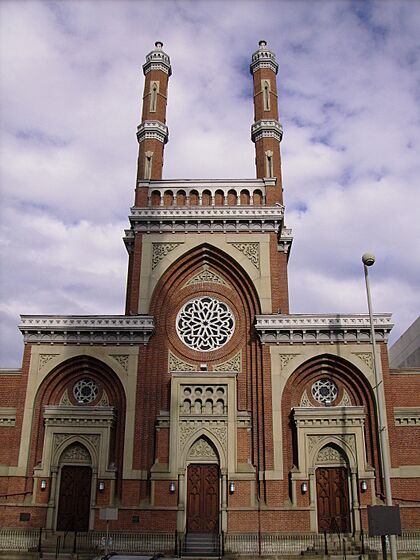Isaac M. Wise Temple facts for kids
Quick facts for kids Isaac M. Wise Temple |
|
|---|---|

The Isaac M. Wise Temple, in 2006
|
|
| Religion | |
| Affiliation | Reform Judaism |
| Ecclesiastical or organisational status | Synagogue |
| Leadership |
|
| Status | Active |
| Location | |
| Location | Plum Street:
|
| Country | United States |
| Architecture | |
| Architect(s) | James Keys Wilson |
| Architectural type | Synagogue architecture |
| Architectural style |
|
| Date established | 1841 (as a congregation) |
| Completed | 1866 |
| Construction cost | $275,000 |
| Minaret(s) | Two |
The Isaac M. Wise Temple, also known as the Plum Street Temple, is a very old and important synagogue in Cincinnati, Ohio. It is a special place for Reform Judaism, which is a branch of the Jewish faith. The building was named after Rabbi Isaac Mayer Wise, who helped start Reform Judaism in the United States.
A famous architect named James Keys Wilson designed the temple. Its unique look was inspired by the Alhambra, a beautiful palace in Spain. The temple is located at 720 Plum Street in Cincinnati. It was mostly built during the American Civil War and cost a lot of money back then – about $275,000!
The temple officially opened on August 24, 1866. It is one of the oldest synagogue buildings still standing in the United States. The Plum Street Temple is right across the street from the historic Saint Peter In Chains Cathedral. Because of its amazing architecture and its important role in the Reform Jewish movement, the temple was added to the National Register of Historic Places in 1972. It was also named a National Historic Landmark in 1975.
In 1976, the congregation grew and opened a new building in Amberley Village. This new center includes another synagogue, a community area, and a school.
Contents
The Temple's Story
How the Congregation Started
In 1840, a group of Jewish immigrants from Germany living in Cincinnati decided to form their own congregation. They called it K.K. B'nai Yeshurun. Before this, they were part of another group called K. K. Bene Israel. Their first meeting place was in a home on Third Street. In 1841, they bought and fixed up a four-story brick house on Lodge Street to use as their place of worship.
The congregation built its very first synagogue building in 1848. It was on Lodge Street and was designed in the Gothic Revival style. This building, known as the Lodge Street Synagogue, was dedicated on September 22, 1848.
Rabbi Isaac Mayer Wise and the New Temple
In 1853, the congregation chose Rabbi Isaac Mayer Wise to be their spiritual leader. He was a very energetic and visionary person. Under his leadership, the congregation and Cincinnati quickly became a major center for Jewish life in the country.
The idea for the grand Plum Street Temple came about before the Civil War. The 200 families of K. K. B'nai Yeshurun wanted a magnificent building for their growing congregation. The Plum Street Temple was mainly built during the Civil War, from 1865 onwards. It was a huge project! The temple was officially dedicated on Friday, August 24, 1866. An old book showing all the costs of building the temple was found in the early 2000s. A special piano song called The Progress March was even written to celebrate the temple's opening!
Important Leaders and Moments
After Rabbi Wise, Louis Grossmann became the Temple's rabbi, serving from 1898 to 1922. Later, James G. Heller was the rabbi from 1920 to 1952.
A very important event happened at the Plum Street Temple in 1972. Sally Priesand was ordained there. This means she officially became a rabbi. Sally Priesand was the first woman to be ordained as a rabbi by a rabbinical school in the United States. She was also the second formally ordained female rabbi in Jewish history worldwide.
The Plum Street Temple was recognized for its historical importance in 1972 when it was listed on the National Register of Historic Places. It was then named a National Historic Landmark in 1975. In 1976, the congregation opened the Isaac M. Wise Center on Ridge Road in Amberley Village, expanding their facilities.
Gallery
See Also
- List of Cincinnati Local Historic Landmarks
- List of National Historic Landmarks in Ohio
- National Register of Historic Places listings in Cincinnati
- Oldest synagogues in the United States
 | Isaac Myers |
 | D. Hamilton Jackson |
 | A. Philip Randolph |





